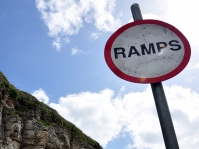This is the second book I've read by the esteemed Mr. Berton. While "Prisoners of the North" is a biography of five individuals connected to the Arctic, "The Arctic Grail" is a history of the quest for the North West Passage and the North Pole (both geographic and magnetic) from 1818 to 1909. But it is not just a recitation of events. Berton exercises his considerable skill at exposing the personalities of the characters involved and really brings the history to life.
At almost 700 pages "The Arctic Grail" is a hefty tome and despite Berton's skill as a story-teller it does drag on in places. Not every story connected to the exploration of Canada's Arctic is exciting. But the book is not meant to be pure entertainment. His goal was to provide a single narrative for the entire period of exploration. Countless books and articles exist on each of the events and people he covers but there is little in existence that attempts to tie it all together.
As expected much of the book focuses on the doomed expedition of Sir John Franklin and the subsequent attempts to discover the fate of his ships and men. This topic was covered in "Prisoners of the North" from the perspective of Franklin's tenacious wife Jane, but here a much more comprehensive account of the events is provided. This section of the book was made all the more interesting because the government of Canada recently announced it had discovered the location of the wreck of one of the ships from the Franklin expedition, over 150 years after it was lost. Reading about the vast sums of money, the endless human suffering and the tragic loss of life that all happened as a result of the search for this ship in the 19th century truly underscores the significance of this discovery.
Although the exploits of Franklin and other British explorers is interesting I also found the stories unceasingly frustrating. The British Navy of the time stubbornly refused to learn from the mistakes of its previous expeditions. And at no time did it acknowledge that there might be something to be learned from the Inuit about Arctic living. These failures led to so much avoidable suffering and death that even the stories of miraculous survival and escape are marred by the fact that most of the hardship need never have occurred in the first place.
For me, the stories of the Norwegian explorers Fridtjof Nansen and Roald Amundsen were much more interesting because those men took the time to properly prepare for their expeditions. They adapted their tactics to the conditions of the Arctic rather than using standard naval practices like the British. As a result their respective missions succeeded with relative ease. This makes their stories less exciting, but, to me at least, also much more satisfying.
If you're interested in the history of Arctic exploration, particularly by sea, this book is a good overview of many of the key events and can help lead you to topics to explore in a deeper manner. I intend to seek out further material on the Norwegians and will attempt to avoid further reading about the failures of the British.


